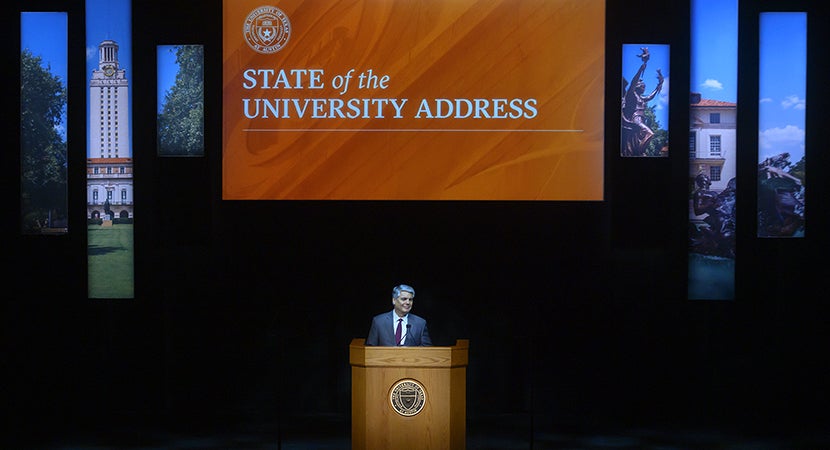AUSTIN, Texas — Looking to the future of The University of Texas at Austin and how it can best change the world, President Gregory L. Fenves unveiled the new Council for TEXAS Impact during his 2019 State of the University address.
“The council’s purpose will be to think deeply about the future and identify key areas where UT can have the most impact on Texas, the nation, and the world,” said Fenves.
Composed of more than 20 faculty members, along with two staff members and three student leaders, the council will be chaired by professors Bobby Chesney in the School of Law and Lauren Meyers in the College of Natural Sciences. It will host a series of forums across campus in the coming months. Fenves urged members of the UT community to bring their boldest ideas so the new council best reflects the university’s vision.
“At UT, we say, ‘What Starts Here Changes the World,” Fenves said. “With the Council for TEXAS Impact, we will think about what that world will look like decades from now and imagine the breakthroughs, discoveries and goals we should focus on to change it for the better. I hope all of you will join me in this effort.”
During the annual address in the B. Iden Payne Theatre on the UT campus, Fenves also announced:
- The “Texas Challenge” to raise $50 million to build on the Texas Advance Commitment financial aid program for middle- and low-income students.
- Long-term efforts to increase student housing spaces.
- A new graduate fellowship program in the College of Liberal Arts.
Earlier this year, thanks to a $160 million endowment approved by The University of Texas System Board of Regents, UT expanded its financial commitment aid to cover the full cost of tuition for students whose families earn up to $65,000, with some form of aid guaranteed for families earning up to $125,000.
Since the announcement, Fenves said many alumni have approached the university and asked, “Can we do more?”
“The answer is yes,” said Fenves in unveiling the Texas Challenge, a call to donors to raise an additional $50 million for financial aid. Every dollar alumni and friends contribute to the challenge will go directly to student scholarships, said Fenves.
Although financial aid reduces tuition costs for many families, the rising cost of housing in Austin continues to present significant obstacles for many, Fenves acknowledged.
“If a student can’t afford to live in Austin, that’s a barrier to their success,” said the president. “And as a university with a history of denying equitable access to qualified students, it’s our responsibility not to allow barriers but to create opportunities for students from all backgrounds.”
UT will hire an experienced consulting firm to study student housing at UT, with the ultimate goal of offering on-campus housing to all first-year undergraduate students. Several steps toward that goal are already underway, Fenves added, such as making 700 spaces available in the newly acquired West Campus apartment complex at 2400 Nueces St., and the planned replacement of the Creekside residence hall that will add 700 to 900 new spaces.
A generous new endowment will address another area of ongoing financial concern – funding for graduate students. Thanks to a donation from the Littlefield Estate, Fenves announced, the College of Liberal Arts will create the Clyde Rabb Littlefield Distinguished Graduate Fellows Endowment to recruit exemplary graduate students.
In addition to these new initiatives, the university this year allocated $10 million to support graduate student tuition while the Graduate Funding Task Force finalizes sustainable, long-term recommendations due later this year. Fenves also said 63 new faculty members have been hired in the second phase of UT’s Faculty Investment Initiative. Another 40 lines were just announced for cluster and interdisciplinary hiring of faculty members who cross the boundaries of disciplines and fields.
“The scope of our influence is enormous,” said Fenves. “And as a result, people everywhere are looking to us to lead.”
To realize its goals, the university needs to look toward the future, which is the charge of the new Council for TEXAS Impact.
“And when we think about the future,” said Fenves, “we have a responsibility to make good on the promise of our potential. To expand our influence. To be bold. To reach even higher heights.”
For a full transcript of his speech, please visit the president’s website.




